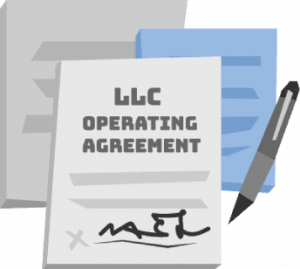How to Start an LLC in Kentucky
A Limited Liability Company (LLC) protects the personal assets of their owner from lawsuits and bankruptcy. LLCs in Kentucky also provide more flexibility than other business types when it comes to how taxes are paid and how the business is managed.
To start an LLC in Kentucky, you file paperwork called Kentucky Articles of Organization with the Kentucky Secretary of State and pay a $40 registration fee. Our guide shows you how to pick a name, file state paperwork, create internal documents, register a domain, file annual reports, and maintain your privacy through it all.

1. Name Your LLC
You need to make sure the name you want is available in Kentucky. Search business names in Kentucky to check that no other business has already snagged your preferred name. Your LLC name must also meet Kentucky’s name requirements as outlined in KY Rev Stat § 14A.3-010.
Your LLC’s name must:
- Include limited liability company or limited company, or the abbreviation LLC or LC
- Not include words or abbreviations to make it sound like the LLC is another kind of entity, like corp or limited partnership
- Be unique among business names in Kentucky
Got the perfect LLC name but aren’t ready to form your business just yet? File a Reservation or Renewal of Reserved Name for $15 with Kentucky’s Division of Business Filings (DOB), and they’ll hold the name for 120 days.

2. Register Your Domain Name
Next up, you’ll want to secure a domain name for your website. Why are these important? Just like you need a street address to help people find you on a map, you need a domain name to help people find you on the web.
For domain names, it’s better to register earlier rather than later. There are two basic reasons why:
- Credibility: When you bother to establish a professional domain name, you’re letting customers know you take your work seriously.
- Consistency: A domain name that connects to your brand name makes it simpler for customers to remember you, which makes them more likely to seek you out.
At Northwest, we offer domain names in-house. You’ll even get a free year of domain name registration when you hire us to form your business.

3. File Kentucky LLC Articles of Organization
Filing the Articles of Organization is the step that officially creates your LLC. Once you complete the form, you’ll submit it to the Kentucky Division of Business Filings and pay the $40 filing fee.
Tip: Everything you put on your articles becomes part of Kentucky public record. The best way to maintain your privacy is to hire a professional Kentucky registered agent who will list their name and address instead.
This is where you write the name that you plan to register with the state. Don’t forget to include limited liability company or an abbreviation like LLC in the name. And remember, the name you list here can’t be the same or similar to other LLC names in the state.
Tip: While the name you list here will be your LLC’s legal name, you can always use a Kentucky DBA name (DBA stands for doing business as) for your public-facing business name after you register your LLC. A DBA is like a nickname for your business, and to get a DBA in Kentucky you’ll need to fill out a Certificate of Assumed Name ($20) form and then file it with the the state.
This is the physical address where your Kentucky registered agent will be present during regular office hours. In accordance with KY Rev Stat § 14A.4-010, every business in the state must appoint a registered agent. At a minimum, your registered office (and agent) must:
- have a physical address (no PO boxes or virtual offices) in the state of Kentucky
- be open during regular business hours (9am to 5pm) in order to accept legal mail and correspondence
You can serve as your own registered agent, but that means your address will be listed on state forms, which makes it more likely that scammers, and junk mailers have your address.
This is the person or business that your LLC appoints to serve as your point-person regarding all legal mail. You can list yourself as your own registered agent, but you’ll also be required to accept legal mail in person during regular business hours at your registered address—maybe in front of your customers. This may not work if you’re ever on the go or feel like taking a vacation.
Your LLC’s principal office is where the state will send all correspondence. This can be your address, your physical business address, or, if you dig privacy, your registered agent’s address.
Your LLC will begin once Kentucky approves the filing. If you want to delay the start date, you can list a date and time up to 90 days in the future. Most people skip this part.
Indicate whether the LLC will be member-managed or manager-managed. LLCs are either member-managed or manager-managed. In a member-managed LLC, the members (owners) will be in charge of daily operations. In a manager-managed LLC, members hire managers to run the LLC.
Managers are in charge of regular business tasks like hiring and firing employees, writing checks to vendors, and signing agreements and contracts. Our guide to LLC membership structures has more information on different types of LLCs you can form.
Check the box if the LLC is at least 51% veteran-owned. State law allows veteran-owned LLCs to waive the $40 filing fee.
Your organizer is the person who completes, signs, and submits the LLC paperwork to the state. The organizer can be you, another member of the LLC, or a person outside of your LLC like your registered agent. Kentucky needs your organizer’s name and signature. If you hire Northwest, we’ll be your organizer and sign our name here.
This is where your registered agent gives their consent to serve as your LLC’s registered agent. Again, this can be you, another member of the LLC, or someone else you trust. When you hire Northwest, our signature goes here.
How Do You File Kentucky Articles of Organization?
You can submit your Kentucky Articles of Organization (LLC) online by mail, or in person. Online and in person filings are approved the same day they are received. Mailed filings can take up to a week to be approved.
Online:
Kentucky SOS One-Stop
Mail:
Office of the Secretary of State
P.O. Box 718
Frankfort, KY 40602-0718
In person:
Capitol Building
Room 152
700 Capital Avenue
Frankfort, KY 40601
What is a professional LLC in Kentucky?
A professional LLC (PLLC) is a type of legal business entity that offers limited liability protection for licensed professionals like lawyers, doctors, engineers, and other high-liability professions. LLCs and PLLCs differ in that only licensed professionals can form and be members of PLLCs.

4. Adopt an LLC Operating Agreement
LLC operating agreements are internal documents that should address things like membership duties, revenue sharing, how to remove a member, and even the procedure for dissolving your LLC. In the event of a disagreement among LLC members, your operating agreement will serve as the blueprint for resolving it. While there is no legal requirement for your Kentucky -based LLC to have an operating agreement, it’s good business practice to write one.
If you’re not sure where to start, use our attorney-approved Kentucky LLC operating agreement template.
.

5. Get an EIN
An Employer Identification Number (EIN) is a nine-digit federal tax identification number for your business. You’ll need to get an EIN to open a business bank account, pay taxes, apply for loans, and in some cases, secure business permits and licenses.
You can get an EIN for free from the IRS, or you can hire Northwest and we’ll get your EIN for you.

6. Get a Business Bank Account
Mixing your personal and business finances is a great way to weaken your LLC’s liability protection. If your business gets sued or goes bankrupt, and you haven’t kept your finances separate, a court could find that your LLC isn’t truly a separate entity from you, the owner. That’s why it’s important to open a business bank account as soon as your LLC gets rolling.
Banks have different requirements for opening business accounts, but here’s what you’ll most likely need in order to open an account for your LLC:
- A copy of your Kentucky Articles of Organization
- Your LLC’s EIN
- LLC operating agreement
If your LLC has more than one member, you’ll also need an LLC resolution for banking account.

7. File State Reports
The Kentucky Annual Report is due between January 1st and June 30 each year. Your first report is due the year after you form your LLC. For example, if you formed your LLC in 2023, your report will be due by June 30 of 2024. The report costs $15.
Tip: Not great at remembering due dates? Hire Northwest and we’ll file for you.
Let’s Set Up Your Kentucky LLC!

